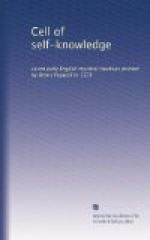In the ghostly feeling of this onehead may a loving soul both say and sing (if it list) this holy word that is written in the book of songs in the Bible: Dilectus meus mihi et ego illi;217 that is: “My loved unto me and I unto Him”; understanden that God shall be knitted with the ghostly glue of grace on His party, and the lovely consent in gladness of spirit on thy party.
And therefore climb up by this tree, as I said in the beginning; and when thou comest to the fruit (that is, to the reverent affection, the which ever will be in thee if thou think heartily the other two thoughts before, and fage[218] not thyself with no lie, as I said), then shalt thou take good keep[219] of that working that is made in thy soul that time, and shape thee, in as much as thou mayst through grace, for to meek thee under the height of thy God, so that thou mayst use thee in that working other times by itself, without any climbing thereto by any thought. And, sikerly, this is it the which is so meedful as I said, and ever the longer that it is kept from the tree (that is to say, from any thought), and ever the ofter that it is done suddenly, lustily, and likingly, without mean, the sweeter it smelleth, and the better it pleaseth the high King of heaven. And ever when thou feelest sweetness and comfort in thy doing, then He breaketh this fruit and giveth thee part of thine own present. And that that thou feelest is so hard, and so straitly stressing thine heart without comfort in the first beginning, that bemeaneth[220] that the greenness of the fruit hanging on the tree, or else newly pulled, setteth thy teeth on edge. Nevertheless yet it is speedful to thee. For it is no reason that thou eat the sweet kernel, but if thou crack first the hard shell and bite of the bitter bark.




